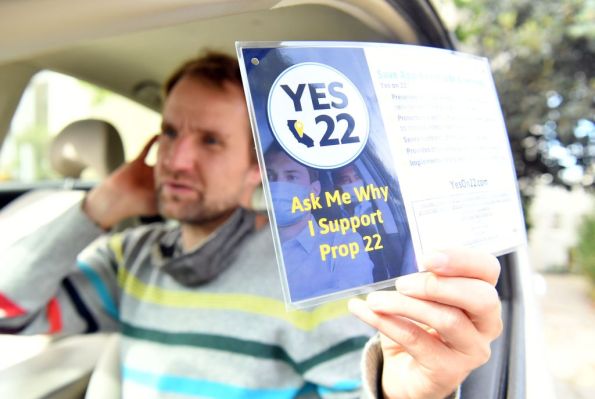Fresh off of its success on Election Day, Uber is signaling that it will continue to push laws similar to the Proposition 22 measure approved by California voters that will keep gig workers classified as independent contractors. The ride-hailing company’s ambitions for laws that preserve its business model are global.
Uber CEO Dara Khosrowshahi said Thursday during an earnings call with analysts that the company will “more loudly advocate for laws like Prop 22.” He later added that it will be a priority of the company “to work with governments across the U.S. and the world to make this a reality.”
What “loudly advocating” for might look like is unclear. Prop 22 was backed by Uber and Lyft as well as on-demand delivery companies DoorDash and Postmates. (Uber is in the process of acquiring Postmates). The push to pass the ballot measure and override a bill passed by the California State Legislature that would have forced companies that use gig workers to classify them as employees was an expensive undertaking. Total contributions to Yes on 22 were around $205 million, making it the most expensive ballot measure in California since 1999.
Here’s his complete thought:
Lastly, on Proposition 22, which we are happy to say passed with a healthy margin in California.
This important question has now been settled in the most populous state in the country. California voters listen to what the vast majority of drivers want: new benefits and protections with the same flexibility. Going forward, drivers and delivery people in California will be guaranteed a minimum earnings standard, health care contributions, accident insurance, increased safety protections and more. We feel strongly that this is the right approach, we should be adding benefits to gig work to make it better, not getting rid of it altogether in favor of an employment only system.
That’s why going forward you’ll see as more loudly advocating for new laws like Prop 22, which we believe strike the balance between preserving the flexibility that drivers value so much, while adding protections that all gig workers deserve. Our proposal for a new pragmatic approach is supported by 82% of drivers and 76% of voters. And it’s a priority for us to work with governments across the U.S. and the world to make this a reality.
For now, Khosrowshahi said the company will be focused on complying with Prop 22, which does require an earnings guarantee of at least 120% of minimum wage while on the job, 30 cents per engaged miles for expenses, a healthcare stipend, occupational accident insurance for on-the-job injuries, protection against discrimination and sexual harassment and automobile accident and liability insurance. The earnings guarantees and reimbursement for expenses reflects a driver’s engaged time, not for the time spent between rides or deliveries.
“We are very much focused on the execution of Prop 22 as it relates to our drivers” he said. Khosrowshahi said this could raise rates, but noted that any increases “wouldn’t have a significant effect on trip volumes one way or the other, based on the kinds of sensitivities that we have seen in the past.”
